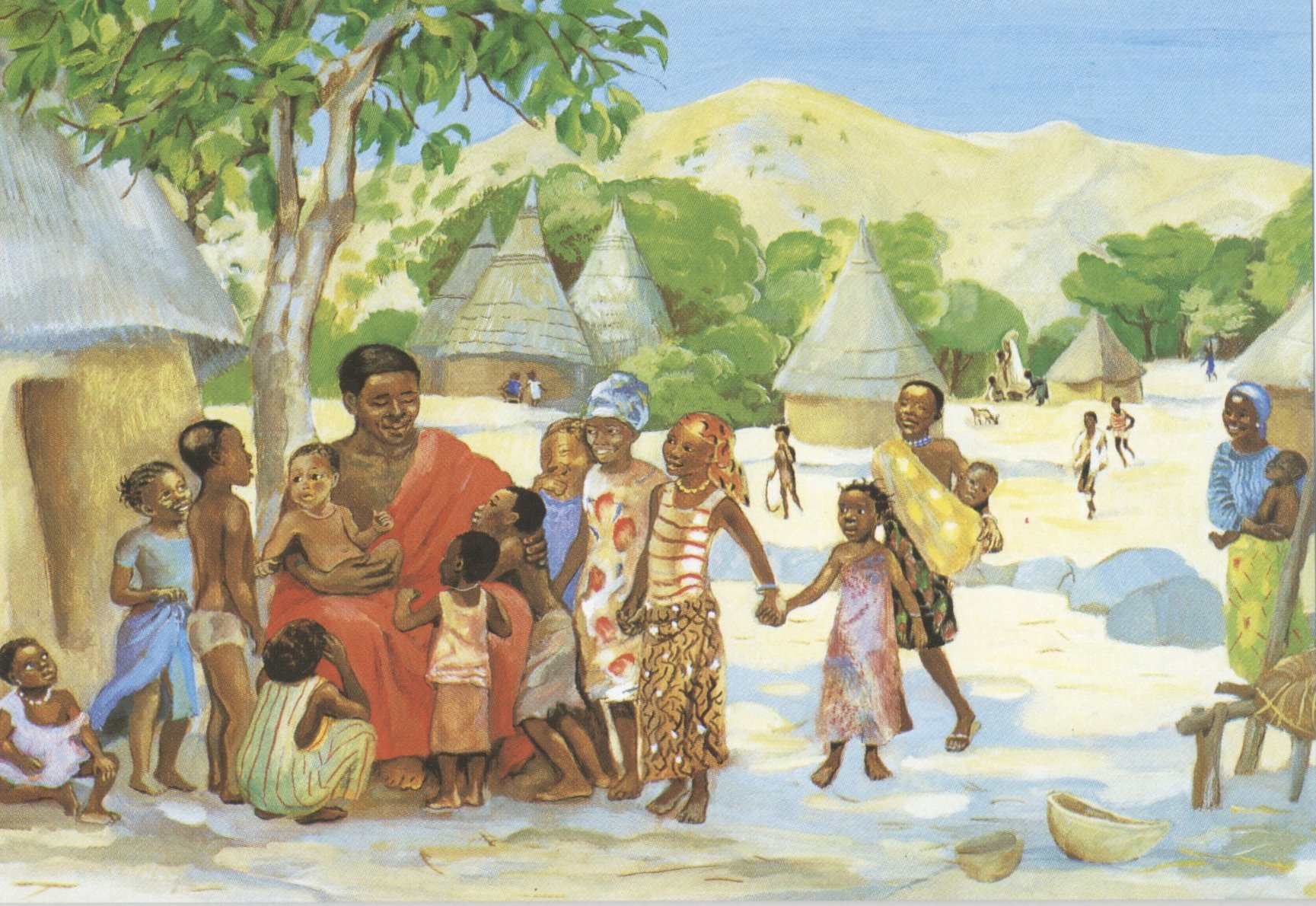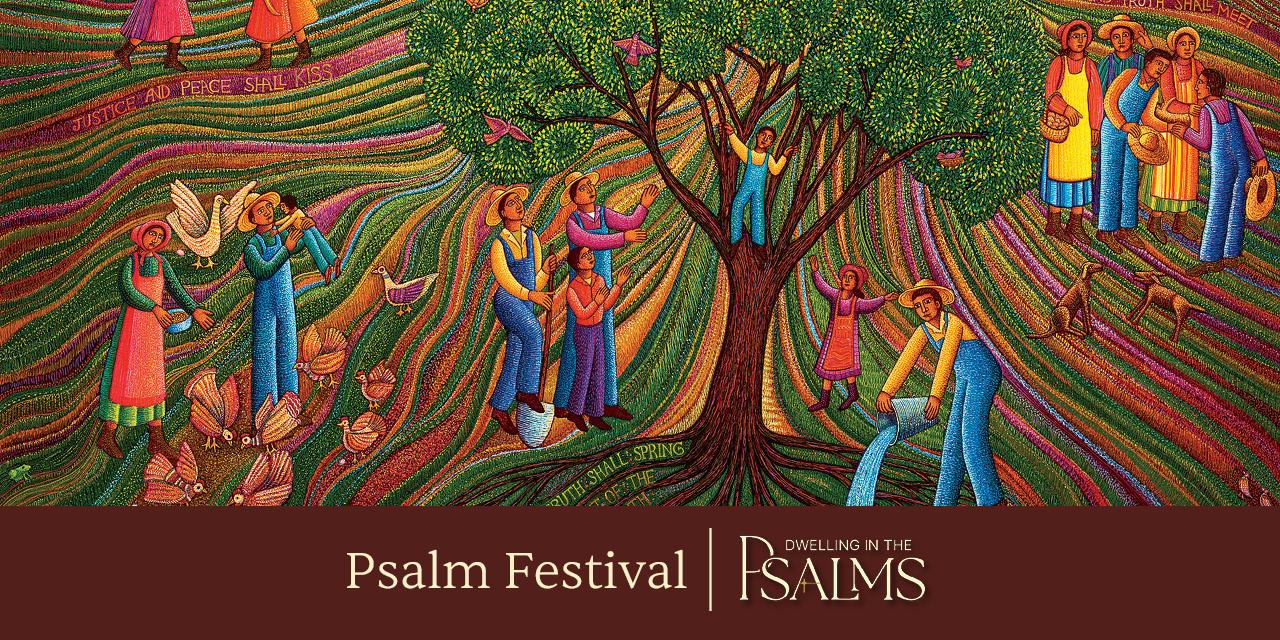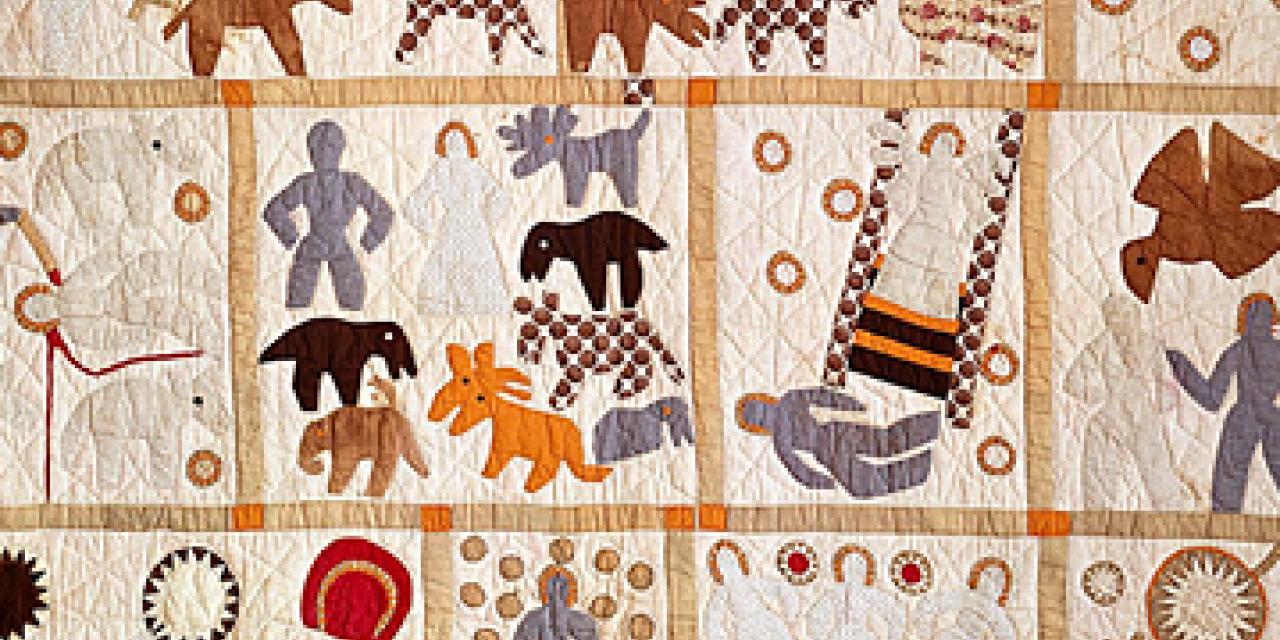Dwelling in the Word is a communal Bible engagement process in which people reflect on and discuss the same scripture passage repeatedly over time. Churches have found that Dwelling in the Word is a good way of engaging people of all ages in discerning how God is calling and sending them into the community.
The steps are easy to learn. People listen to a scripture passage read by two different people. If able, listeners read along. They reflect on words or phrases that capture their attention and then pair up with someone they don’t know well. Each person takes turns answering questions, such as: “What did you notice in this passage?”, “What question might you like to ask a Bible scholar?”, and “What might God be nudging us to do in this passage?” Then each person reports their partner’s responses to the group.
Works well with Godly Play
Congregations around the world use Godly Play or the similar Young Children in Worship book and its sequel to introduce children as young as age two to God’s story. As with those approaches, Dwelling in the Word invites participants to ponder a passage and share “I wonder” questions.
Children as young as age two or three can participate in Dwelling in the Word, according to Jo Williams, vicar of the Church of England Parish of St. Mark and All Saints, Reading. That parish dwells before every church meeting and in the monthly children’s service. Dwelling with children works best when using simplified language, such as in the International Children’s Bible or the New International Reader’s Version.
In a post on the Diocese of Oxford website, Williams writes about dwelling with children in Luke 10:1–12, a passage about Jesus sending out disciples that the whole parish was dwelling with. Children were asked, “I wonder what you liked best?”, “I wonder what you particularly noticed in the story today?”, and sometimes “I wonder what part of the story is about you?"
She reports that children focused first on the theme of peace in verses 5 and 6. When asked how they could tell people about God’s kingdom, a five-year-old replied, “Peace is the most important thing; you have to say that first.” Other children responded, “Yes, that way they will know you are a friend,” and “We say peace to everyone when we (high five / fist bump) after the story.” Williams notes: “The children realized it was the same peace that Jesus gave all.”
Using visual prompts in a Godly Play style has worked well with children and adults, both for Williams and for adults in the Oxford Diocese mission and ministry department. Department director Andrew Anderson-Gear says, “One of my colleagues, Yvonne Harris, a children’s and family ministry specialist, created a Godly Play version of Luke 10:1–12. The story mat was green, with dots for towns. The wooden Jesus figure sent people figures out in pairs. (Harris) did it in adult sessions with directors of children and youth ministry. We rejoiced that we as adults got to experience the power of a story told that way. Of course, not all dwelling passages adapt so easily to this method.”
Feel free to use or adapt the Luke 10 Godly Play resources that Yvonne Morris developed: Luke 10 Godly Play Dwelling script and Creating Godly Play Way of Dwelling in Luke 10. Her Doing Dwelling in the World with Children gives detailed instructions for dwelling with children or with children and adults, whether as part of a worship service or during children’s education or other group sessions.

Makes children feel like part of the congregation
Eastern Avenue Christian Reformed Church in Grand Rapids, Michigan, began Dwelling in the Word during a long transition between lead pastors. Adults began dwelling virtually during the COVID-19 pandemic, and, after returning to in-person meetings, they introduced children to the practice.
“A third- to fifth-grade group developed out of our church’s practice of Dwelling in the Word,” says Kristy Bootsma, Eastern Avenue’s pastor of faith formation. “The self-named ‘Deep Questioners’ began in 2022 as an every-other-Wednesday space for our kids to read scripture together and share their observations and questions. They needed very little instruction on how to enter into the quiet and listen to God. They didn’t need to be taught how to pay attention or share their wonderings. It’s so natural for them to read and ask ‘What does this mean for me today?’
“What has been most impactful for this group’s dwelling together is that it doesn’t matter how much or little you know about the Bible or what you are reading. The words you notice are from God, not from how much of the Bible you have memorized. Some students are eager to share how a verse reminded them of what they learned in Bible class at school; some ask questions about the author and who they were talking to originally. Sometimes we talk about the questions that came up to see if anyone in the group has an answer, but answers to our questions aren’t the point. The point is that we listen to God together,” Bootsma says.
The Deep Questioners sometimes begin meetings with using fidget toys to move their bodies or listening to a song. Sometimes they share with a partner, other times with the whole group. They’ve met outdoors on the grass, inside the fellowship hall, and with candles under the stained glass in the sanctuary.
“I liked being in the sanctuary better because I felt closer to God,” Charlotte Bolt said after finishing fifth grade. “It’s also quieter and more peaceful in there. There’s fewer distractions so it’s easier to focus on God and the passage.”
She explained how the group got its name: “One of the first times our group met, someone asked, ‘What should we name our group?” I remember thinking back to what my mom said about the purpose of the group being about asking deep questions related to our faith, so I spoke up and offered ‘Deep Questioners.’ The group liked the name, so it stuck, and now we call ourselves DQs for short. As a bonus, we make trips to Dairy Queen at the end of each season.”
She described DQ as ”a very communal space where you don’t feel weird if you say an answer. Everyone in the community supports you. Every question you ask is OK and not weird, and you don’t have to worry about it seeming like a non-Christian question. It is also a great balance of being treated like an adult as we dwell in the Word but also having kid time and enjoying snacks and stuff. And I like knowing that the congregation is dwelling on the same passage as us sometimes. It feels together even though we do it separately.”
Bolt said her DQ opportunities to read and discuss scripture and ask faith-based questions led her to ask Pastor Kristy to prepare her to make profession of faith.
Includes youth in ministry discernment
St. Matthew’s Episcopal Church in St. Paul, Minnesota, is diverse in nationality, economic levels, age, gender, and sexuality. “We believe that the more diverse we become, the more we look like God’s Kingdom or Reign,” the church website states. The congregation began Dwelling in the Word in 2006, led by Blair Pogue, their rector and lead pastor. Pogue reports that dwelling at vestry and other church meetings led the congregation to wonder where God was leading them in mission.
The result was what the congregation called the Way of Jesus at St. Matthew’s, a focus on eight practices that also inspired the Episcopal Way of Love. “We’ve learned together how to listen for God’s voice . . . often using Dwelling in the Word . . . [which] has become integral to our common life,” Pogue said in her January 2022 farewell sermon. She is now Canon for Vitality & Innovation in the Episcopal Church of Minnesota.
The congregation includes children and youth not only in the core practices of Eucharist and Dwelling in the Word, but also in ministry discernment. While developing their Way of Jesus, leaders asked intergenerational groups to playfully dwell in the Word.
“Artists painted pictures of the future they believed God was bringing forth; our youth group and staff took pictures of what they thought God was up to; parents of young children shared their favorite children’s story that revealed something about God; our hospitality team planned a menu embodying the future God is bringing forth; and people constructed visions of our church’s future with Legos,” Pogue wrote in an Episcopal Church Foundation post.
Before the COVID-19 pandemic, St. Matthew’s had been part of an overnight shelter system for unhoused families. However, conversations with overnight guests led them to question how well they were meeting their hospitality goal in their aging building, which offered no privacy or showers. They included youth in discerning how to address this dilemma and eventually launched a renovation campaign.
Helps all ages live within God’s story
Going to church camp is a tradition in the Dutch Reformed Church in South Africa. Marius J. Nel, an ordained DRC minister and New Testament professor at Stellenbosch University, has experimented with a clever way to help people understand the concept of living within a story. He’s occasionally asked church campers to dwell in secular advertisements, such as those for real estate. “We note how seductive the promises are, how the ads present perfection,” Nel says. “Then we move to Dwelling in the Word as an invitation to partake in the unfinished story of God.
“I’m on the steering committee at the church where my wife, Miriam Nel, is pastor. Our committee often dwells in the Word. I’ve done dwelling with older teens in catechism classes. In my experience, children as young as twelve or thirteen can be part of an intergenerational dwelling conversation.
“Here in the mountainous region of Stellenbosch, we have found that dwelling in Psalm 121 is helpful for youth and adults. Our country is in transition, the economy is in trouble, and we have rolling blackouts. As the ANC [African National Congress] gradually loses power, there’s a lot of uncertainty about the future. We sometimes use mountains as a metaphor for impossible obstacles. But Psalm 121 helps us see mountains as a symbol of hope.”

